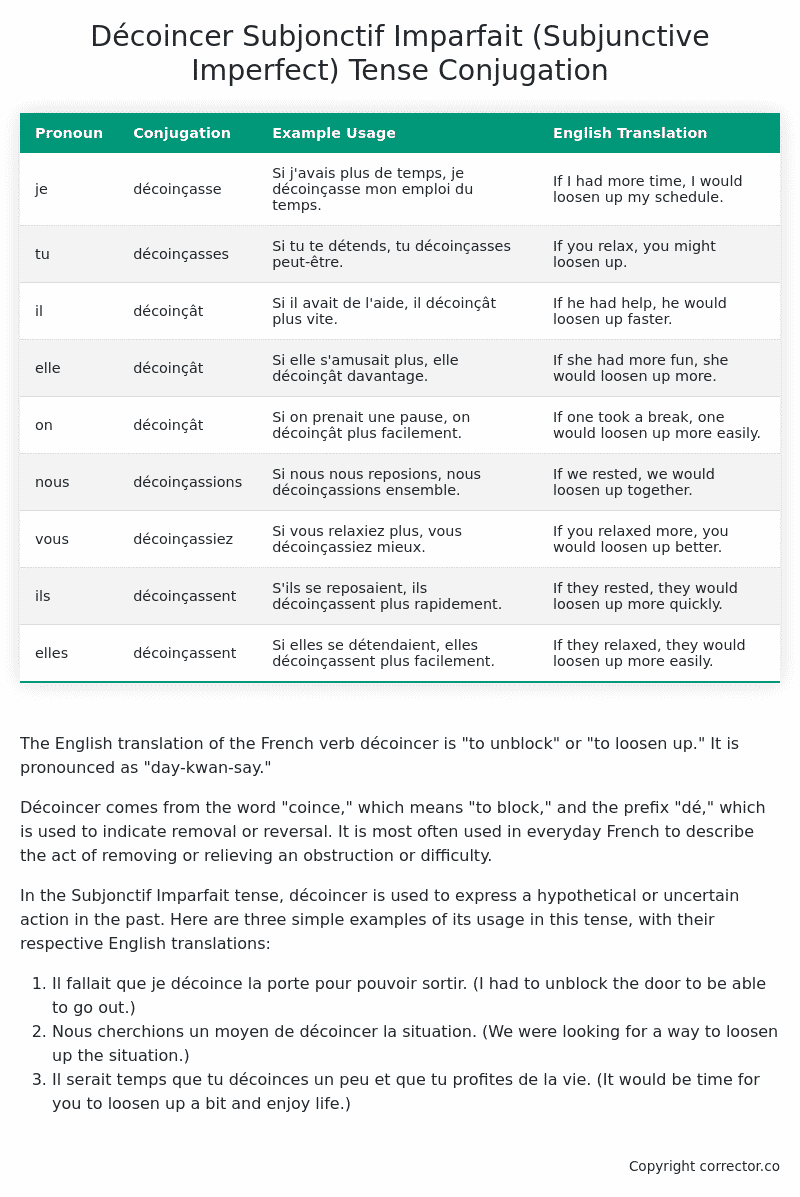Subjonctif Imparfait (Subjunctive Imperfect) Tense Conjugation of the French Verb décoincer
Introduction to the verb décoincer
The English translation of the French verb décoincer is “to unblock” or “to loosen up.” It is pronounced as “day-kwan-say.”
Décoincer comes from the word “coince,” which means “to block,” and the prefix “dé,” which is used to indicate removal or reversal. It is most often used in everyday French to describe the act of removing or relieving an obstruction or difficulty.
In the Subjonctif Imparfait tense, décoincer is used to express a hypothetical or uncertain action in the past. Here are three simple examples of its usage in this tense, with their respective English translations:
- Il fallait que je décoince la porte pour pouvoir sortir. (I had to unblock the door to be able to go out.)
- Nous cherchions un moyen de décoincer la situation. (We were looking for a way to loosen up the situation.)
- Il serait temps que tu décoinces un peu et que tu profites de la vie. (It would be time for you to loosen up a bit and enjoy life.)
Table of the Subjonctif Imparfait (Subjunctive Imperfect) Tense Conjugation of décoincer
| Pronoun | Conjugation | Example Usage | English Translation |
|---|---|---|---|
| je | décoinçasse | Si j’avais plus de temps, je décoinçasse mon emploi du temps. | If I had more time, I would loosen up my schedule. |
| tu | décoinçasses | Si tu te détends, tu décoinçasses peut-être. | If you relax, you might loosen up. |
| il | décoinçât | Si il avait de l’aide, il décoinçât plus vite. | If he had help, he would loosen up faster. |
| elle | décoinçât | Si elle s’amusait plus, elle décoinçât davantage. | If she had more fun, she would loosen up more. |
| on | décoinçât | Si on prenait une pause, on décoinçât plus facilement. | If one took a break, one would loosen up more easily. |
| nous | décoinçassions | Si nous nous reposions, nous décoinçassions ensemble. | If we rested, we would loosen up together. |
| vous | décoinçassiez | Si vous relaxiez plus, vous décoinçassiez mieux. | If you relaxed more, you would loosen up better. |
| ils | décoinçassent | S’ils se reposaient, ils décoinçassent plus rapidement. | If they rested, they would loosen up more quickly. |
| elles | décoinçassent | Si elles se détendaient, elles décoinçassent plus facilement. | If they relaxed, they would loosen up more easily. |
Other Conjugations for Décoincer.
Le Present (Present Tense) Conjugation of the French Verb décoincer
Imparfait (Imperfect) Tense Conjugation of the French Verb décoincer
Passé Simple (Simple Past) Tense Conjugation of the French Verb décoincer
Passé Composé (Present Perfect) Tense Conjugation of the French Verb décoincer
Futur Simple (Simple Future) Tense Conjugation of the French Verb décoincer
Futur Proche (Near Future) Tense Conjugation of the French Verb décoincer
Plus-que-parfait (Pluperfect) Tense Conjugation of the French Verb décoincer
Passé Antérieur (Past Anterior) Tense Conjugation of the French Verb décoincer
Futur Antérieur (Future Anterior) Tense Conjugation of the French Verb décoincer
Subjonctif Présent (Subjunctive Present) Tense Conjugation of the French Verb décoincer
Subjonctif Passé (Subjunctive Past) Tense Conjugation of the French Verb décoincer
Subjonctif Imparfait (Subjunctive Imperfect) Tense Conjugation of the French Verb décoincer (this article)
Subjonctif Plus-que-parfait (Subjunctive Pluperfect) Tense Conjugation of the French Verb décoincer
Conditionnel Présent (Conditional Present) Tense Conjugation of the French Verb décoincer
Conditionnel Passé (Conditional Past) Tense Conjugation of the French Verb décoincer
L’impératif Présent (Imperative Present) Tense Conjugation of the French Verb décoincer
L’infinitif Présent (Infinitive Present) Tense Conjugation of the French Verb décoincer
Struggling with French verbs or the language in general? Why not use our free French Grammar Checker – no registration required!
Get a FREE Download Study Sheet of this Conjugation 🔥
Simply right click the image below, click “save image” and get your free reference for the décoincer Subjonctif Imparfait tense conjugation!

Décoincer – About the French Subjonctif Imparfait (Subjunctive Imperfect) Tense
Formation
Common Everyday Usage Patterns
Interactions with Other Tenses
Subjonctif Présent
Indicatif Passé Composé
Conditional
Conditional Perfect
Summary
I hope you enjoyed this article on the verb décoincer. Still in a learning mood? Check out another TOTALLY random French verb conjugation!


